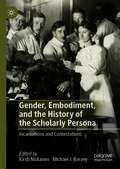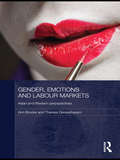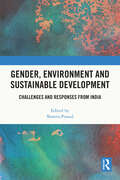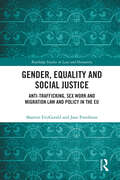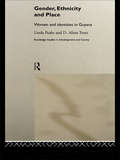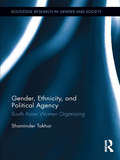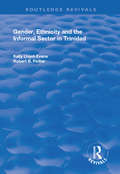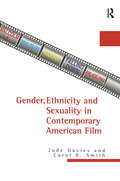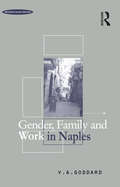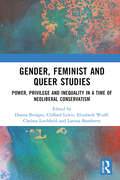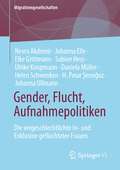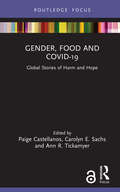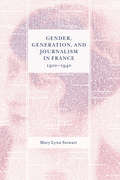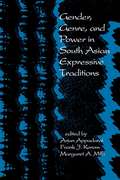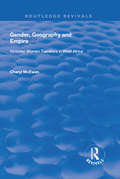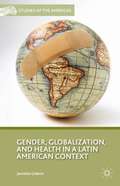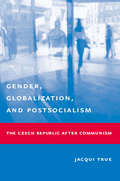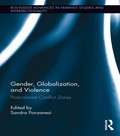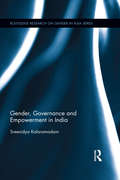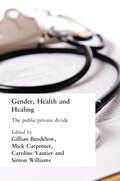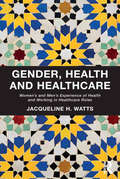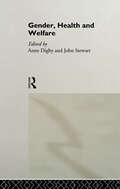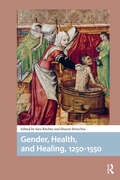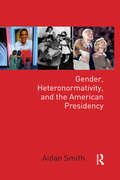- Table View
- List View
Gender, Embodiment, and the History of the Scholarly Persona: Incarnations and Contestations
by Kirsti Niskanen Michael J. BaranyThis book investigates the historical construction of scholarly personae by integrating a spectrum of recent perspectives from the history and cultural studies of knowledge and institutions. Focusing on gender and embodiment, the contributors analyse the situated performance of scholarly identity and its social and intellectual contexts and consequences. Disciplinary cultures, scholarly practices, personal habits, and a range of social, economic, and political circumstances shape the people and formations of modern scholarship. Featuring a foreword by Ludmilla Jordanova, Gender, Embodiment, and the History of the Scholarly Persona: Incarnations and Contestations is of interest to historians, sociologists, media and culture scholars, and all those with a stake in the personal dimensions of scholarship. An international group of scholars present original examinations of travel, globalisation, exchange, training, evaluation, self-representation, institution-building, norm-setting, virtue-defining, myth-making, and other gendered and embodied modes and mechanisms of scholarly persona-work. These accounts nuance and challenge existing understandings of the relationship between knowledge and identity.
Gender, Emotions and Labour Markets - Asian and Western Perspectives: Asian And Western Perspectives (Routledge Studies in Social and Political Thought)
by Ann Brooks Theresa DevasahayamConcepts of emotion and emotional labour have largely been defined in European and American terms and according to Euro-American sensibilities with little attention given to the question of whether emotional work or emotional labour is different globally. In particular little has been written about the issue of what defines emotions and emotional labour in public work contexts and how it is configured in different cultural contexts. Gender, Emotions and Labour Markets considers how, and in what ways, emotional labour characterises formal and informal work environments in both Asia and the West. Key themes covered include: human rights issues and gender equity in formal and informal work contexts in Asia and the West; men, masculinity and emotional labour; impact on the work-life balance of professional women in Asian and Western contexts; the impact of the ‘feminization of migration’ in servicing high-end economic professionals; the impact of the new economy, organizational constraints on labour markets; and demographic patterns such as fertility, procreation, marriage, divorce in both Asian and Western contexts.
Gender, Environment and Sustainable Development: Challenges and Responses from India
by Shweta PrasadThis book studies environment and sustainable development from the perspective of gender. It focuses on three major themes, including sustainability of development practices, policy perspectives on environmental management and climate change and its gendered impact. It includes contributions from academicians working across disciplines and practitioners working at the grassroots levels. The book addresses issues facing India amid a growing global environmental crisis and suggests policy measures for environmental protection and to improve the quality of life of its inhabitants. Lucid and topical, the volume will be an indispensable resource for students, researchers of gender, environment and sustainable development, sociology and public policy. It will also be a great resource for advocacy groups, non-governmental organisations (NGOs) and policymakers working in the area.
Gender, Equality and Social Justice: Anti Trafficking, Sex Work and Migration Law and Policy in the EU (Routledge Studies in Law and Humanity)
by Jane Freedman Sharron FitzGeraldThis book addresses a gap in both contemporary theorising and empirical analysis of the European Union’s (EU) law and policy frameworks on migration, sex work and anti trafficking. Drawing on the authors’ previous research on these policies and with their practical experience of engaging with various EU institutions in law and policy-making fora around gender, equality and justice, the work examines the processes involved in constructing and enacting policy frameworks and legal interventions on these issues, within a feminist analytical framework. The authors map how EU agenda-setting operates, and detail the roles that various EU institutions, external groups and actors, including non-governmental organisations, play in promoting or blocking policy on these three issues. The book draws on feminist theorising on gender, policy-making and social justice to develop a general theoretical framework to help us understand how and why a consensus has seemingly been achieved at EU level on what constitutes gender equality in these three policy areas. The book presents a valuable resource for academics, researchers and policy makers in Law, Migration, EU policy making and Gender Studies.
Gender, Ethnicity and Place: Women and Identity in Guyana (Routledge Studies in Development and Society)
by Linda Peake D. Alissa TrotzThis book is concerned with the nature of the relationship between gender, ethnicity and poverty in the context of the external and internal dynamics of households in Guyana. Using detailed data collected from male and female respondents in three separate locations, two urban and one rural, and across two major ethnic groups, Afro-Guyanese and Indo-Guyanese, the authors discuss the links between gender and race, exploring development issues from a feminist perspective.
Gender, Ethnicity and Political Agency: South Asian Women Organizing (Routledge Research in Gender and Society #35)
by Shaminder TakharThis book examines how South Asian women’s collective agency is operationalized through civic organizations in the UK. Drawing on black feminist theory and third world feminism, it shows the complexity of political agency and its relationship to identity and subjectivity, and uses empirical research to demonstrate how women are empowered to resist domination. The historically racialized image of the South Asian woman as lacking in political agency is challenged through their long history of activism on the Indian subcontinent. The creation of "critical spaces" by South Asian women in the diaspora places them as active agents who have successfully influenced social policy on important issues such as forced marriage, domestic violence and sexuality. The engagement with the empirical data demonstrates the significance and impact of race, racism, sexism and religion on the lives of the women. The book brings to the fore the pursuit of equality, rights and justice, including multiculturalism and the often debated emancipatory role of religion.
Gender, Ethnicity and the Informal Sector in Trinidad
by Robert B. Potter Sally Lloyd-EvansThis title was first published in 2002. Throughout much of the developing world and especially in Africa and Latin America, the informal employment sector is growing spectacularly. This study focuses on the gender and ethnic aspects of the informal economy in Trinidad.
Gender, Ethnicity, and Sexuality in Contemporary American Film (Baas Paperbacks Ser. #Vol. 5)
by Jude Davies Carol R. SmithFirst Published in 2000. Routledge is an imprint of Taylor & Francis, an informa company.
Gender, Family and Work in Naples
by Victoria A. GoddardBreaking new ground in Mediterreanean anthropology, this book rejects the discipline's traditional focus on honour and shame in small face-to-face communities, and suggests instead that gender and sexuality interact with material processes in the constitution of personal and social identities. In this ethnographic account of the labour market in Naples, the author shows how cultural definitions of gender can be used to investigate broad social processes. Scarce stable employment in the area means that household members are forced to diversify their economic activities in order to survive. Petty entrepreneurship is an option which is almost exclusively available to men. Women, who are either unable or unwilling to obtain factory work, are generally confined to the status of outworkers. The author emphasises that individual choices cannot be attributed solely to economic opportunities but that concepts of selfhood, gender identity and the symbolic value of female sexuality are also important.
Gender, Feminist and Queer Studies: Power, Privilege and Inequality in a Time of Neoliberal Conservatism
by Donna Bridges Clifford Lewis Elizabeth Wulff Chelsea Litchfield Larissa BamberryExploring scholarship, research, practice and activism on gender, feminist and queer studies, this edited collection examines, analyses and critiques the nature and causes of inequality, disadvantage and marginalisation faced by women, non-hegemonic and LGBTIQA+ identities who do not fit hegemonic notions of masculinity, femininity and heteronormativity. The chapters in this book critically analyse and challenge visible and invisible power relations, privilege and prejudice by problematising the artificial organisation of people into hierarchies that preference hegemonic masculinities, white and heteronormative identities. In questioning often unchallenged and legitimised inequality and disadvantage, this book locates itself in the juxtaposition where the lived experiences of individuals, activism, community participation, research and scholarship collide with mainstream, local, national and globalised culture and politics. Divided into four parts, this book provides a platform for interrogating how social change can occur in the current neoliberal political context of increasing conservatism.
Gender, Flucht, Aufnahmepolitiken: Die vergeschlechtlichte In- und Exklusion geflüchteter Frauen (Migrationsgesellschaften)
by Helen Schwenken H. Pınar Şenoğuz Sabine Hess Elke Grittmann Nevra Akdemir Johanna Elle Ulrike Koopmann Daniela Müller Johanna UllmannFlucht- und Aufnahmeprozesse sind durchzogen von geschlechtsspezifischen und intersektionalen Dynamiken. Die Autorinnen haben diese und das darin zu Tage tretende Geschlechterwissen im Verbundforschungsprojekt „Gender – Flucht – Aufnahmepolitiken“ für die Themen Unterbringung, Gewaltschutz, Erwerbstätigkeit, Medien, Familie, ‚Heimischwerden‘ und Solidarität analysiert.Die migrationsbezogene Infrastruktur hat sich in der deutschen Migrationsgesellschaft auf die Bedarfe von Geflüchteten eingestellt. Geflüchtete machen mit den Angeboten vielfältige Erfahrungen, die von hilfreicher und solidarischer Unterstützung über wenig angepasste Angebote bis zu Exklusion und Diskriminierung reichen. Die rahmende Medienanalyse zeigt, wie tief die öffentliche und mediale Rezeption der sogenannten „Flüchtlingskrise“ durch vergeschlechtlichte Narrative geprägt ist, und wie diese die kommunale und ehrenamtliche Arbeit mit Geflüchteten mitprägen.Der Band richtet sich an Interessierte aus Studium, Forschung und Praxis, die sich mit Flucht, Migration und/oder Geschlechterverhältnissen befassen.
Gender, Food and COVID-19: Global Stories of Harm and Hope (Routledge Focus on Environment and Sustainability)
by Paige Castellanos, Carolyn E. Sachs and Ann R. TickamyerThis book documents how COVID-19 impacts gender, agriculture, and food systems across the globe with on-the-ground accounts and personal reflections from scholars, practitioners, and community members. During the coronavirus pandemic with many people under lockdown, continual agricultural production and access to food remain essential. Women provide much of the formal and informal work in agriculture and food production, distribution, and preparation often under precarious conditions. A cadre of scholars and practitioners from across the globe provide their timely observations on these issues as well as more personal reflections on its impact on their lives and work. Four major themes emerge from these accounts and are interwoven throughout: the pervasiveness of food insecurity, the ubiquity of women’s care work, food justice, and policies and research that can that can result in a resilience that reimagines the future for greater gender and intersectional equality. We identify what lessons we can learn from this global pandemic about research and practices related to gender, food, and agricultural systems to strive for more equitable arrangements. This book will be of great interest to students, scholars and practitioners working on gender and food and agriculture during this global pandemic and beyond.
Gender, Generation, and Journalism in France, 1910-1940
by Mary Lynn StewartIn the late nineteenth century, the first wave of female journalists began writing in the French daily press. Yet, while they undeniably opened doors for the next generations of educated women, sexist hiring practices, assumptions about women’s aptitudes as reporters, and more subtle gender biases continued to saturate the industry in the decades that followed. Gender, Generation, and Journalism in France, 1910–1940 investigates the careers and written work of ten women who regularly reported in the national, Paris-based dailies. Addressing the role of mentorship, family connections, gendered behaviours, reporting styles, and subject matter, Mary Lynn Stewart debunks lingering essentialist notions about women’s entry into journalism. She shows that struggling newspapers, attempting to reverse declining circulation, hired women to cover subjects that expanded to include international relations, colonial conflicts, trials, local politics, and social problems. Through content analysis, deixis, and systematic comparisons of several women and men reporting on the same or different events, she further queries claims about a feminine style, finding more similarities than differences between masculine and feminine reporting. Documenting the persistence of gender discrimination in the hiring, assigning, and assessment of women reporters in the French daily press, Gender, Generation, and Journalism in France, 1910–1940 demonstrates that, through the support of their female colleagues, women managed to succeed despite a variety of challenges.
Gender, Genre, and Power in South Asian Expressive Traditions
by Arjun Appadurai Frank J. Korom Mills Margaret AThe authors cross the boundaries between anthropology, folklore, and history to cast new light on the relation between songs and stories, reality and realism, and rhythm and rhetoric in the expressive traditions of South Asia.
Gender, Geography and Empire: Victorian Women Travellers in Africa
by Cheryl McEwanThis title was first published 2000: This text is intended to draw together two important developments in contemporary geography: firstly, the recognition of the need to write critical histories of geographical thought and, particularly, the relationship between modern geography and European imperialism; and secondly, the attempt by feminist geographers to countervail the absence of women in the histories. The author focuses on the narratives of British women travellers in West Africa between 1840 and 1915, exploring their contributions to British imperial culture, teh ways in which they wer empowered in the imperial context by virtue of both "race" and class, and their various representations of West African landscapes and peoples. The book argues for the inclusion of women and their experiences in histories of geographical thought and explores the possibilities and problems of combining feminist and post-colonial approaches to these histories.
Gender, Globalization, And Health In A Latin American Context
by Jasmine GideonUsing a political economy of health, this book examines the linkages between gender, globalization, and health in a Latin American context.
Gender, Globalization, and Postsocialism: The Czech Republic After Communism
by Jacqui TrueTrue examines political and gendered identities in flux in post-communist Czech Republic. She argues that the privatization of a formerly state economy and the adoption of consumer-oriented market practices were shaped by ideas and attitudes about gender roles. This book also offers a provocative general thesis about the inextricable linkages between political and economic changes and gender identities.
Gender, Globalization, and Postsocialism: The Czech Republic After Communism
by Jacqui TrueHow are changing gender relations shaping and being shaped by post-socialist marketization and liberalization? Do new forms of economic and cultural globalization open spaces for women's empowerment and feminist politics? The rapid social transformations experienced by the people of the Czech Republic in the wake of the collapse of communism in 1989 afford political scientist Jacqui True with an opportunity to answer these questions by examining political and gendered identities in flux. She argues that the privatization of a formerly state economy and the adoption of consumer-oriented market practices were shaped by ideas and attitudes about gender roles.Though finely tuned to the particular, local traditions that have defined the boundaries of globalization for Czech men and women, Gender, Globalization, and Postsocialism also offers a provocative general thesis about the inextricable linkages between political and economic changes and gender identities.
Gender, Globalization, and Violence: Postcolonial Conflict Zones (Routledge Advances in Feminist Studies and Intersectionality #17)
by Sandra PonzanesiThis wide-ranging collection of essays elaborates on some of the most pressing issues in contemporary postcolonial society in their transition from conflict and contestation to dialogue and resolution. It explores from new angles questions of violent conflict, forced migration, trafficking and deportation, human rights, citizenship, transitional justice and cosmopolitanism. The volume focuses more specifically on the gendering of violence from a postcolonial perspective as it analyses unique cases that disrupt traditional visions of violence by including the history of empire and colony, and its legacies that continue to influence present-day configurations of gender, race, nationality, class and sexuality. Part One maps out the gendered and racialized contours of conflict zones, from war zones, prisons and refugee camps to peacekeeping missions and humanitarian aid, reframing the field and establishing connections between colonial legacies and postcolonial dynamics. Part Two explores how these conflict zones are played out not just outside but also within Europe, demonstrating that multicultural Europe is fraught with different legacies of violence and postcolonial melancholia. Part Three gives an idea of the kind of future that can be offered to post-conflict societies, defined as contact zones, by exploring opportunities for dialogue, restoration and reconciliation that can be envisaged from a gendered and postcolonial perspective through alternative feminist practices and the work of art and their redemptive power in mobilizing social change or increasing national healing processes. Though strongly anchored in postcolonial critique, the chapters draw from a range of traditions and expertise, including conflict studies, gender theory, visual studies, (new) media theory, sociology, race theory, international security studies and religion studies.
Gender, Governance and Empowerment in India (Routledge Research on Gender in Asia Series)
by Sreevidya KalaramadamSince the mid-1980s, the presence of women in governance has become a major marker of successful democracy in global and national discourses on the democratization of society. A diverse set of nation-states have legislatively mandated gender quotas to ensure the presence of elected women representatives (EWRs) in various rungs of governance. Since 1993, the Indian state has legislated a massive program of democratization and decentralization. As a result, more than 1.5 million EWRs have taken office within the lower rungs of governance or the Panchayati Raj Institutions (PRI). This book is an ethnography of the Indian state and its policy of legislated entry of women into political life. It argues that political participation of women is necessary to change the political practices in society, to make institutions more gender, class and caste representative, and to empower individual women to negotiate both formal and informal institutions. Its locus is the everyday life contexts of EWRs in the southern Indian state of Karnataka who negotiate their own meanings of politics, state, society, empowerment and political subjectivity. Analysing three factors – structural boundaries, sociocultural divisions and conjunctural limitations imposed on the participation of EWRs by political parties – the book demonstrates that the social embeddedness of PRIs within everyday practices and social relations of identity and power severely constrain and shape the political participation and empowerment of EWRs. Providing a valuable insight into contemporary state and feminist praxis in India, this book will be of interest to scholars of grass-roots democracy, gender studies and Asian politics.
Gender, Health and Healing: The Public/Private Divide
by Gillian Bendelow, Mick Carpenter, Caroline Vautier and Simon WilliamsWhat do we mean by 'gender' and how does this relate to health?How is 'biology' best understood?What does a focus on the division of labour bring to our understanding of health work?Is (gender) 'equity' in health possible?How have developments such as the resurgence of emotions and the new genetics affected these and other social relations at the turn of the century?These are just some of the questions addressed in Gender, Health and Healing in which a whole range of issues are brought together and connected to emerging concerns in contemporary life such as the new genetics and transformations in biomedical knowledge and practices. It offers a challenging assessment of gender relations and embodied practices across the public/private divide, using health and healing as paradigmatic examples.This thought-provoking volume lies at the intersection of gender studies, the sociology of health and healing, health policy, the critical analysis of scientific knowledge and the current debates around the body, health and emotions. Bringing together new and leading scholars in the field, it provides a unique critical overview of contemporary debates in health care for an interdisciplinary readership.
Gender, Health and Healthcare: Women’s and Men’s Experience of Health and Working in Healthcare Roles
by Jacqueline H. WattsHealth status and the experience of working in health care roles are both strongly shaped by gender and, although there have been attempts to incorporate ’gender awareness’ in both health and employment policies, the significance of gender in these areas continues to be marginalised within public debates and academic discourses. Taking a social constructionist perspective, Watts considers the ways in which gender impacts upon health in all its elements including access, technology, professionalisation, health promotion and health as an important sector of the labour market. She discusses gender as a developing and diversified category, exploring ideas about masculinity and the fluidity of gender boundaries in determining individual identity. Chapters that follow discuss men’s and women’s health; ideology of gender and health, specifically exploring different social norms and ideas about male and female health and the dominant ideological association between femaleness and caring; working for health with particular focus on the gendered interplay of caring and curing roles; technology and changes to gender, health and healthcare; health promotion as a gendered activity and, finally, the importance of introducing an intersectional approach beyond gender to articulate a deeper understanding of health in a postmodern context. The concluding chapter draws together these themes to underscore the importance of placing gender at the centre of health and health care delivery to fully take account of both the different life and health experiences of men and women and the gendered dimensions of working in health care.
Gender, Health and Welfare
by Anne Digby John StewartGender, Health and Welfare deals primarily with the century before the creation of the classic welfare state in Britain. It provides a stimulating introduction to an historical era which saw a huge expansion in welfare services, both state and voluntary, and during which women emerged as significant 'consumers' and 'providers' of various measures.
Gender, Health, and Healing, 1250-1550 (Premodern Health, Disease, and Disability)
by Sara Ritchey Sharon StrocchiaThis path-breaking collection offers an integrative model for understanding health and healing in Europe and the Mediterranean from 1250 to 1550. By foregrounding gender as an organizing principle of healthcare, the contributors challenge traditional binaries that ahistorically separate care from cure, medicine from religion, and domestic healing from fee-for-service medical exchanges. The essays collected here illuminate previously hidden and undervalued forms of healthcare and varieties of body knowledge produced and transmitted outside the traditional settings of university, guild, and academy. They draw on non-traditional sources -- vernacular regimens, oral communications, religious and legal sources, images and objects -- to reveal additional locations for producing body knowledge in households, religious communities, hospices, and public markets. Emphasizing cross-confessional and multilinguistic exchange, the essays also reveal the multiple pathways for knowledge transfer in these centuries. Gender, Health, and Healing, 1250-1550 provides a synoptic view of how gender and cross-cultural exchange shaped medical theory and practice in later medieval and Renaissance societies.
Gender, Heteronormativity, and the American Presidency (Global Gender)
by Aidan SmithGender, Heteronormativity and the American Presidency places notions of gender at the center of its analysis of presidential campaign communications. Over the decades, an investment in gendered representations of would-be leaders has changed little, in spite of the second- and third-wave feminist movements. Modern candidates have worked vigorously to demonstrate "compensatory heterosexuality," an unquestionable normative identity that seeks to overcome challenges to their masculinity or femininity. The book draws from a wide range of archived media material, including televised films and advertisements, public debates and speeches, and candidate autobiographies. From the domestic ideals promoted by Eisenhower in the 1950s, right through to the explicit and divisive rhetoric associated with the Clinton/Trump race in 2016; intersectional content and discourse analysis reveals how each presidential candidate used his or her campaign to position themselves as a defender of traditional gender roles, and furthermore, how this investment in "appropriate" gender behaviour was made manifest in both international and domestic policy choices. This book represents a significant and timely contribution to the study of political communication. While communication during presidential elections is a well-established research field, Aidan Smith’s book is the first to apply a gendered lens over such an extended historical period and across the political spectrum.
